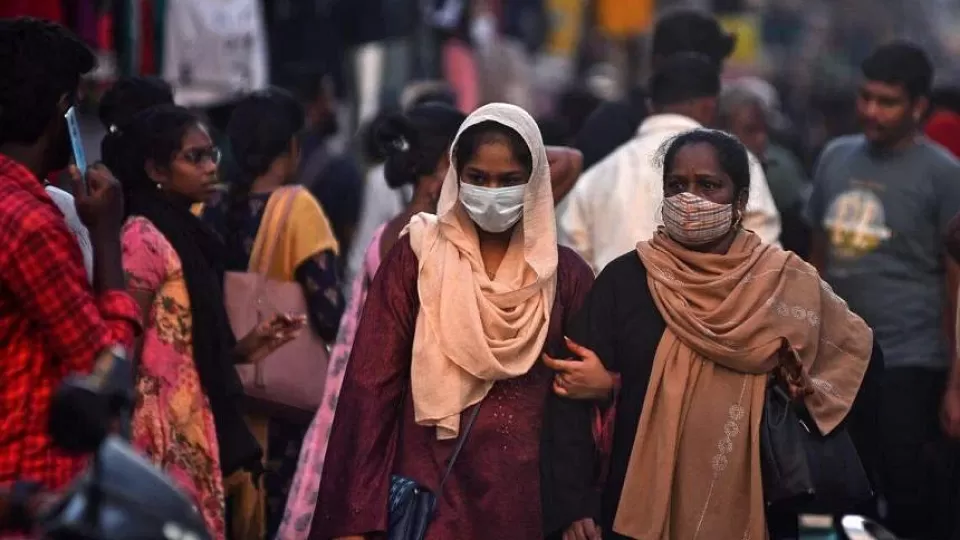April 14, 2023
SINGAPORE – The World Health Organisation (WHO) is monitoring the new Arcturus Covid-19 sub-variant, which is fuelling a recent surge of cases in India.
The Omicron sub-variant XBB.1.16, first detected in late January, is a recombinant of two descendants of another BA.2 Omicron variant.
The WHO said that the sub-variant has one additional mutation in the spike protein.
Laboratory studies show that Arcturus has increased infectivity, as well as potential increased pathogenicity.
The symptoms of XBB.1.16 are reportedly the same as previous variants, which include fever, shortness of breath and a cough.
However, many of those infected are also reporting conjunctivitis and sticky eyes.
A study by the University of Tokyo showed that Arcturus is nearly 1.2 times as transmissible as XBB.1.5, also known as Kraken, the most infectious sub-variant until now.
But the sub-variant is not thought to be any more severe than XBB.1.5, reported British news outlet The i newspaper.
The sub-variant’s name, Arcturus, was made popular by Dr Vipin Vashishtha, former convenor of the Indian Academy of Paediatrics.
He used it as a hashtag in a tweet on March 17 warning about new Covid-19 cases, according to New Delhi Television.
The sub-variant is behind a thirteenfold surge in cases in India in March. The spike in cases has led the country to conduct mock drills to check whether hospitals are prepared to deal with rising case counts.
On Wednesday, there were 40,215 active Covid-19 cases – up by 3,122 in just one day, statistics from India’s Ministry of Health and Family Welfare showed.
Two Indian states have also reintroduced mask wearing in public places as Covid-19 cases in the country reached their highest weekly number in seven months, reported The Telegraph on Wednesday.
In the northern state of Haryana, face masks are now mandatory in public places and schools.
Masks are also compulsory for pregnant women, the elderly and those with chronic diseases in the southern state of Kerala, a popular tourist destination.
It is the first time mask mandates have been implemented in India since March 2022, and they have sparked concern in the country.
Doctors in India are urging citizens to remain calm. Although the new sub-variant appears to be more contagious, they say that there has not been an uptick in fatalities so far.
Some cases of Arcturus have been reported among infants, said The Telegraph.
“We need to remain alert, but there is no need to worry,” said Indian Health Minister Mansukh Mandaviya in the report.
“Currently, the sub-variant of Omicron which is circulating in the country hasn’t led to an increase in the rate of hospitalisation,” he added.
The sub-variant, which is reportedly one of more than 600 Omicron sub-variants, was first detected in January. It has been detected in more than 20 countries, including Singapore, the United States, Britain and Australia.
In the last week of March in Singapore, 28,410 Covid-19 cases were recorded. This is almost double the previous week’s figure of 14,467. It is not known how many of these cases are due to the new sub-variant.
The Ministry of Health told CNA that the current Covid-19 infection wave is driven by a mix of XBB sub-variants, including XBB.1.5, XBB.1.9 and XBB.1.16.
However, it added that there is currently no evidence of increased severity in the cases.
At a press conference on March 29, WHO Covid-19 technical lead Maria Van Kerkhove said: “(Arcturus) has been in circulation for a few months. We haven’t seen a change in severity in individuals or in populations, but that’s why we have monitoring systems in place.”
The variant has high infectivity and pathogenicity, Dr Van Kerkhove noted.
Although Arcturus has been found in other countries, most cases were from India, where it had overtaken other variants, she added.
With the emergence of the new sub-variant, some experts said that Covid-19 remains a concern.
Virologist Lawrence Young from the University of Warwick told The Independent that the rise of the new variant in India is a sign that “we’re not yet out of the woods”.
“We have to keep an eye on it,” Professor Young said.
“When a new variant arises you have to find out if it’s more infectious, more disease-causing, is it more pathogenic? And what’s going to happen in terms of immune protection.”
“These kinds of things highlight the importance of genomic surveillance, but a lot of countries including our own have let our guard down a bit, and we can’t be sure what variants are around and what level of infection they’re causing until we see a significant outbreak.”
In 2021, India was devastated by the Delta wave, with a total of 4.7 million excess deaths according to estimates by the WHO.
The country’s health system was overwhelmed by a surge of cases triggered by the Delta Covid-19 variant, with some hospitals even running out of oxygen.

